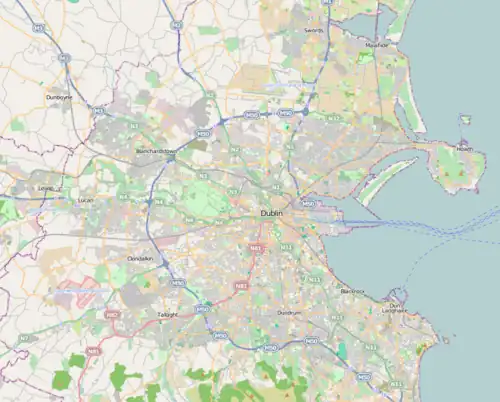| Beggars Bush Barracks | |
|---|---|
| Beggars Bush, Dublin | |
 The former central garrison headquarters at Beggars Bush Barracks | |
 Beggars Bush Barracks Location within Dublin | |
| Coordinates | 53°20′11″N 6°14′07″W / 53.336371°N 6.235284°W |
| Type | Barracks |
| Site information | |
| Operator | |
| Site history | |
| Built | 1827 |
| Built for | War Office |
| In use | 1827–1929 |
Beggars Bush Barracks was a British Army barracks located at Beggars Bush in Dublin, Ireland.
History
The barracks were designed as a training depot for the British Army and were completed in 1827,[1] built on lands received from George Herbert, 11th Earl of Pembroke. Two squadrons of the South Irish Horse were formed at the barracks in the early 20th century.[2] The squadrons were mobilised at the barracks in August 1914 before being deployed to the Western Front.[3]
Beggars Bush Barracks were the first barracks to be handed over to the Irish Republican Army in January 1922.[4] The barracks then became the new headquarters of the National Army.[5] Erskine Childers, a leading IRA revolutionary, was executed at the barracks on 24 November 1922 after conviction by an Irish military court for the unlawful possession of a gun, a weapon presented to him by Michael Collins.[6]
The barracks were decommissioned in 1929 and handed over to the "Gaeltacht Industries Depot" which had responsibility for marketing goods produced in Ireland.[7] The site is now used by various other Government Departments.[1] The Irish Labour History Society Museum is based in the former central garrison headquarters[8] and the National Print Museum is based in the former Garrison Chapel.[9]
References
- 1 2 "History". Beggars Bush. Retrieved 15 October 2017.
- ↑ "South Irish Horse". Combined Irish Regiments Association. Retrieved 14 October 2017.
- ↑ Chris Baker (1996–2008). "The South Irish Horse—Regiments of the Special Reserve—North Irish Horse". The long, long trail. Retrieved 28 November 2008.
- ↑ "Beggars Bush Barracks". The Irish Times. 22 February 1922. Retrieved 15 October 2017.
- ↑ Valiulis, Maryann Gialanella (1992). Portrait of a Revolutionary: General Richard Mulcahy and the Founding of the Irish Free State. University Press of Kentucky. p. 127. ISBN 978-0813117911.
- ↑ Ring, Jim (September 2004). "Childers, (Robert) Erskine (1870–1922)". Oxford Dictionary of National Biography. Oxford, England: Oxford University Press.
- ↑ Cosgrove, Art (2008). A New History of Ireland, Volume II : Medieval Ireland 1169-1534. Vol. 2. Oxford Scholarship Online. p. 552. ISBN 978-0199539703.
- ↑ "Museum Visit - Irish Labour History Society and National Print Museum (IMA Event)". Irish Museums. Retrieved 15 October 2017.
- ↑ "History of the Museum". National Print Museum of Ireland. Retrieved 15 October 2017.